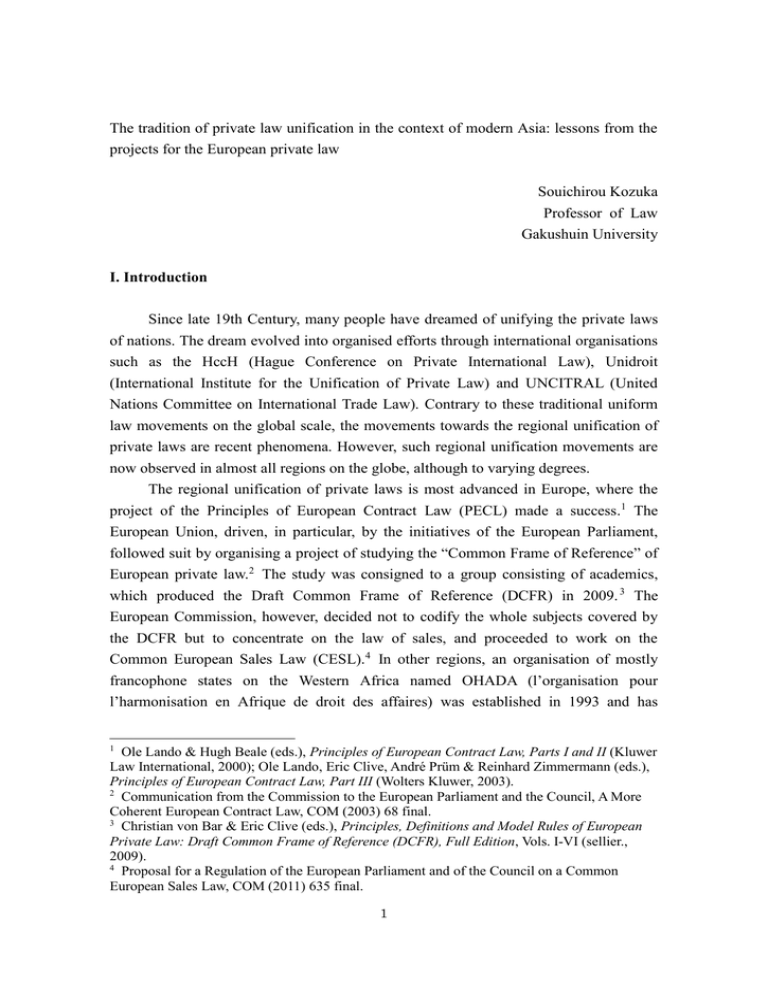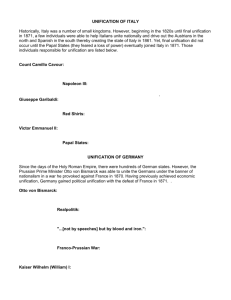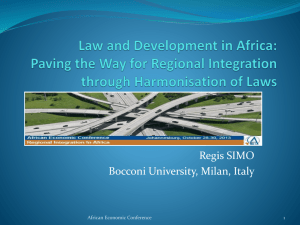DOC
advertisement

The tradition of private law unification in the context of modern Asia: lessons from the projects for the European private law Souichirou Kozuka Professor of Law Gakushuin University I. Introduction Since late 19th Century, many people have dreamed of unifying the private laws of nations. The dream evolved into organised efforts through international organisations such as the HccH (Hague Conference on Private International Law), Unidroit (International Institute for the Unification of Private Law) and UNCITRAL (United Nations Committee on International Trade Law). Contrary to these traditional uniform law movements on the global scale, the movements towards the regional unification of private laws are recent phenomena. However, such regional unification movements are now observed in almost all regions on the globe, although to varying degrees. The regional unification of private laws is most advanced in Europe, where the project of the Principles of European Contract Law (PECL) made a success.1 The European Union, driven, in particular, by the initiatives of the European Parliament, followed suit by organising a project of studying the “Common Frame of Reference” of European private law.2 The study was consigned to a group consisting of academics, which produced the Draft Common Frame of Reference (DCFR) in 2009. 3 The European Commission, however, decided not to codify the whole subjects covered by the DCFR but to concentrate on the law of sales, and proceeded to work on the Common European Sales Law (CESL).4 In other regions, an organisation of mostly francophone states on the Western Africa named OHADA (l’organisation pour l’harmonisation en Afrique de droit des affaires) was established in 1993 and has 1 Ole Lando & Hugh Beale (eds.), Principles of European Contract Law, Parts I and II (Kluwer Law International, 2000); Ole Lando, Eric Clive, André Prüm & Reinhard Zimmermann (eds.), Principles of European Contract Law, Part III (Wolters Kluwer, 2003). 2 Communication from the Commission to the European Parliament and the Council, A More Coherent European Contract Law, COM (2003) 68 final. 3 Christian von Bar & Eric Clive (eds.), Principles, Definitions and Model Rules of European Private Law: Draft Common Frame of Reference (DCFR), Full Edition, Vols. I-VI (sellier., 2009). 4 Proposal for a Regulation of the European Parliament and of the Council on a Common European Sales Law, COM (2011) 635 final. 1 promulgated nine uniform acts since then. The American Continent has a long history of attempting to unify private international law rules through CIDIPs (Specialized Conferences on International Private Law), convened by the Organization of American States (OAS), since the first CIDIP in 1975. Apparently Asia has been least developed in such regional unification of laws, but recently a private group of academics has worked on the Principles of Asian Contract Law (PACL). The emergence of such regional unification of laws has raised a kind of competition between the global and regional unification works. Further, the regional law-making initiatives are perceived, at least in Europe, as derogations from the undoubted paradigm of modern legal system that the nation state monopolises the power to make and enforce laws.5 Thus, while the global unification of laws had seldom been regarded as threatening the paradigm of the “law of nation-states,” the regional unification has led to a question about the appropriate political unit for law-making: whether it should be global, regional or national. As long as the paradigm of the “law of nation states” is concerned, the question is also relevant in Asia. The arguments over the most appropriate law-making body, however, appear to be complicated and sometimes confused, due to the various issues of different levels argued without clear distinctions. This paper examines the question by considering the issues one by one. First, it considers the issue of national law versus regional law by examining the arguments made in Europe for and against the European private law (II). Secondly, it analyses the issue of regional versus global uniform law mainly through the review of OHADA’s frustrated project of codifying the Uniform Act on Contracts as its tenth Uniform Act (III). Finally, it explores the issue of whether or not to have uniform laws by contrasting the traditional and more recent justifications for uniform law making (IV). As a conclusion, this paper sees the possibility of regional unification in Asia in a much different meaning from the regional unification in Europe (V). II. Regional law as a non-State law? European private law and social justice When the European Commission decided to launch the project on European The paradigm is mentioned by Ralf Michaels as “the methodological nationalism.” See Ralf Michaels, Globalization and Law: Law Beyond the State, in: Reza Banakar & Max Travers (eds.), Law and Social Theory, second edition (Hart Publishing, 2013). 5 2 private law and consigned the work of editing the DCFR to the Study Group on European Civil Code, the leader of the Study Group, Prof. von Bar, made a speech at the Cour de Cassation of France titled “Vers un Code civil européen. From Principles to codification: prospect for European private law.”6 The speech, which advanced the prospect that steps towards the common “Civil Code” will be made in Europe, was met by the strong resistance in France. The fact that a German professor made a speech in English at the core institution of French judiciary and predicted the unpromising future of the French Civil Code was more than sufficient to give rise to furies among French lawyers.7 Law professors in France emphasised the diversity of culture and language that should lie behind the legal texts and criticised the project for the European Civil Code as unjustified attempt “made in secretism.”8 Against such opposition to the European Civil Code in France, some academics in other countries responded by emphasising the social justice as the shared value in Europe. These academics questioned the European Commission’s approach of justifying the unification of contract law as means to advance market integration. According to them, just as the civil codes codified in the nineteenth century reflected the fundamental value of the civil society at that time, the uniform contract law in Europe must be the legal scheme of social justice.9 The leading commentator of this group later enumerated the justice, freedom, protection of human rights, economic welfare, solidarity and social responsibility as the core values of private law.10 Pluralism of private law There is, however, another argument defending the European private law based on the legal pluralism. The argument recognises the concurrent existence of the European Union and Member States and sees in it the plurality of law-making powers. The plurality is also observed with the autonomous regions within nation states, such as 6 Christian von Bar, From Principles to Codification: Prospect for European Private Law, Columbia Journal of European Law, vol.8, p.370 (2002). 7 Ralf Michaels, Code vs Code: Nationalist and Internationalist Images of the Code Civil in the French Resistance to a European Codification, European Review of Contract Law, vol.8, p.277 (2012). 8 Motion de l’Académie des Sciences morales et politiques (1er juillet 2002), publié dans: Bénédicte Fauvarque-Cosson & Denis Mazeaud (red.), Pensée juridique française et harmonisation européenne du droit, p.57 (Société de legislation comparée, 2003). See also Pierre Legrand, Antivonbar, Journal of Comparative Law vol.1, issue 1, p.13 (2006). 9 Study Group on Social Justice in European Private Law, Social Justice in European Contract Law: a Manifesto, published in: European Law Journal vol.10, no.6, p.653 (2004). 10 Martijn W. Hesselink, CFR & Social Justice, p.59 (sellier., 2008). 3 the Catalonia and Scotland, or even in the de facto rule-making by private organisations in the form of self-regulation or technical standards.11 Such pluralism connotes the freedom to choose enjoyed by the citizens. 12 Thus, the European private law is advocated as providing a non-State law as an additional alternative of legal system available to the European citizens. Although both of the social justice argument and pluralism argument advocate the European private law from the criticisms raised in particular by the French legal academic, the implications are much different. If it is the social justice shared across Europe that justifies the European private law, then the law must be the “hard rule” applicable as the mandatory law. Otherwise, the social justice will be compromised by avoiding the application of the European law.13 On the other hand, if one is based on the plurality in justifying the European private law, the European law will be an option. It will not replace the national law but exist in concurrence with the latter. Optional instrument as the “blue button” or neutral law? The European Commission has decided that the CESL to be codified shall be an “optional instrument.” Laws of Member States on the same subject (contract of sales) will not be replaced, and a party to a sales transaction is given an option to choose CESL in addition to other laws applicable through the choice of law rules when at least one of the parties is in a Member State of the European Union. According to the European Commission, CESL is a set of rules favourable to consumers or small and medium enterprises and, therefore, will attract these parties as the law to be chosen on the occasion of online and other cross-border trade.14 By using the oft-cited metaphor, CESL will become the “blue button” on the screen (of online transactions) indicating 11 Jan Smits, Diversity of Contract Law and the European Internal Market, in: Jan Smits (ed.), The Need for a European Contract Law: empirical and legal perspectives, p.153 (Europa Law Publishing, 2005). 12 Jan Smits, Plurality of Sources in European Private Law, or: How to Live With Legal Diversity? , in: Roger Brownsword et al. (eds.), The Foundations of European Private Law, p.323 (Hart Publishing, 2011). 13 See Ugo Mattei, Hard Minimal Code Now – A Critique of ‘Softness’ and a Plea for Responsibility in European Debate over Codification, in: Stefan Grundmann & Jules Stuyck (eds.), An Academic Green Paper on European Contract Law (Kluwer Law International, 2002), reproduced in: Ugo Mattei, The European Codification Process: Cut and Paste, p.107 (Kluwer Law International, 2003). 14 Proposal for a Regulation of the European Parliament and of the Council on a Common European Sales Law, COM (2011) 635 final. 4 the trust in the governing law.15 However, it may not be the only reason for CESL to be chosen. Especially in East Europe, the national laws have been regarded as less developed and lack predictability and foreseeability, due to the scarcity of precedents. As a result, it is alleged, that parties from the East European states are always forced to choose the law of the other party when trading with the states in West Europe.16 These Eastern states are now hoping that they can request choosing CESL as the neutral law. In such a case, the advantage of CESL lies in the “de-contexualised” nature of the rules, as the lack of context becomes the advantage of neutrality, rather than the disadvantage.17 The paradigm of “law of the nation state” It is obvious that the European private law is derogation from the paradigm of the “law of nation states.” However, there seems to be no consensus about what element of the paradigm is derogated is. The view emphasising the social justice may see that the “nation” is no longer an appropriate unit for making private law backed by the core values shared by the members of the unit and that, at least in Europe, a larger scale of region provides a more appropriate basis. The proponents of the European private law as an optional instrument will argue that the “state” should not be the sole source of law and that an additional law-making body is welcomed as enhancing the plurality of legal order. Needless to say, with regard to either of the elements, arguments against derogation may also exist. III. Regional versus global uniform law Why CESL and not CISG? When the regional uniform law is, or is going to be, made, it is not sufficient to Martin Engel & Johanna Stark, The CESL as a European Brand – PayPalizing European Contract Law, in: Horst Eidenmüller (ed.), Regulatory Competition in Contract Law and Dispute Resolution, p.337, at pp.339-340 (Beck 2013). 16 Paul Varul, The Impact of Harmonisation of Private Law on the Reform of Civil Law in the New Member States, in: Brownsword, supra note 12, p,291. 17 For the analysis of de-contextualised law, see Ralf Michaels, “One Size Can Fit All” – On the Mass Production of Legal Transplants, in: Günter Frankenberg (ed.), Order from Transfer: Comparative Constitutional Design and Legal Culture Law, second edition, p.56 (Edward Elgar, 2013). 15 5 ask whether it has an advantage over law-making by the nation. Another question that needs to be asked is why the unification must take place regionally and not globally. In the case of Europe, 24 out of 28 Member States are Parties to the CISG. Therefore, having CESL besides CISG on the same subject appears to be redundant. One commentator noted that the benefit of newly drafting CESL is unlikely to exist, all the more when the procedure before the European Court of Justice is being delayed due to the hundreds of backlog cases, while the decisions from various jurisdictions on CISG are made available in the data-base of CLOUT from time to timer and assure the predictability of interpretation of CISG.18 There can be two different answers to such a question, loosely connected to the two arguments advocating the European private law. One is to identify regionally common elements that lay foundations for the regional uniformity in law. Arguments referring to the social justice to be reflected in the European private law might find, though not necessarily, that the regional scope of uniform law coincides with the scope of geographical limits for those values to be shared. On the other hand, if the regional uniform law is advocated as an option to increase the plurality of law, in particular when such an optional law is preferred because of the neutrality of the law-making body, the relevant question may be a political one. Whether regional or global, a body equipped with the motivation and resources to draft and implement the optional uniform law is the most appropriate body of law-making. OHADA’s Uniform Act on Contracts and the “African features” While the question of regional or global uniform law had little relevance in the actual process in Europe, such a question became a serious issue in the course of drafting the OHADA’s Uniform Act on Contracts. The Council of Ministers of OHADA decided in 2001 to launch a program of drafting the Uniform Act on Contracts and approached Unidroit to cooperate. Unidroit asked Prof. Fontaine of Belgium to serve as an expert to advise the project.19 The drafting was primarily based on the Unidroit Principles for the International Commercial Contracts, whose second edition was available at that time, but was required to address the “uniquely African features” at the 18 Petra Butler, The Perversity of Contract Law Regionalization in a Globalizing World, in: Ingeborg Schwenzer & Lisa Spagnolo (eds.), Globalization versus Regionalization, p.13 (eleven international publishing, 2013). 19 Marcel Fontaine, The Draft OHADA Uniform Act on Contracts and the Unidroit Principles of International Commercial Contracts, Uniform Law Review 2004-3 [NS-Vol.IX], p.573, at p.574. 6 same time. Then a difficult question arose as to what the “uniquely African features” are. First, the traditional customary law may exist in some regions within OHADA Member States, but none was found to be commonly shared by all the Member States. Nor were such customary laws found applicable to the general rules of contract, as contrasted to a specific type of transaction. While the transplant of Western legal system at the time of colonisation was commonly observed across the region, the transplanted system was not unique, as OHADA Member States include a jurisdiction of Spanish origin (Equatorial Guinea) and one of Portuguese origin (Guinea Bissau) as well as one common law jurisdiction (part of Cameroun). Finally, as the social background, considerable degree of illiteracy and the lack of “legal culture”, meaning the poor recognition and low trust in the judicial system as the mechanism for resolving disputes, were named. However, the illiteracy was considered as a matter to be addressed by the law of evidence (by not requiring evidence in writing in some cases). The poor “legal culture” was found to be the target to be overcome by the enactment of the Uniform Act on Contracts, rather than the element to be considered in the course of drafting. Thus, the drafting team advised by Prof. Fontaine concluded that there is no serious “African features” to be considered and drafted the text closely tracing the Unidroit Principles.20 Political momentum for adopting the Uniform Act on Contracts It is now obvious that, in the case of OHADA, the regionally shared value cannot justify or motivate the regional making of the uniform law. On the other hand, OHADA does have the competence to proceed with the unification of law, because, according to the Treaty of OHADA, the OHADA Uniform Acts are directly applicable in Members States and the interpretation of Uniform Acts is uniformly made by the Community Court of Justice and Arbitration. As the Unidroit Principles are not statutory rules and can only be applied by national courts where the parties agree on their application or where the Principles are relied on as the general rules of law, there is politically a good reason to enact Uniform Act on contracts closely tracing the rules of Unidroit Principles. However, OHADA has not adopted the draft Uniform Act on contracts for 10 years since the completion of drafting in 2004. In 2010, the Council of Ministers cancelled the decision of 2001, taking note of the need to avoid conflicts of competences with other regional organisations such as CEMAC and UEMOA. Later, it was suggested to study 20 Id., pp.577-578. 7 the possibility of drafting rules on specific types of contracts instead of general rules. However, doubts have been raised against having uniform rules only on specific types of contracts without having the uniform general rules of contract. 21 Having been deprived of the political momentum, the future of the uniform law on contracts in OHADA does not seem to be promising. PACL and Asian uniqueness The experiences in Europe and Africa offer good lessons to Asia. In Asia, the regional integration that can promote regional unification of private law is unlikely to take place in the near future. There is no regional institution in Asia equivalent to OHADA. The drafting of PACL is a purely academic activity that has no prospect for liaising with the political movement. In this respect, PACL is much different from PECL, as, in the case of latter, the contacts with the European Community was involved from the beginning.22 The “Asian uniqueness,” which could be the basis for the regional uniformity in private law, is controversial even among the drafters of PACL.23 While one of the participants deny the Asian unique feature at all, another point to a few black letter rules that have developed commonly in East Asian countries. Still, the alleged Asian feature is not something like the social value shared by the members of the society in the region. However, the Asian uniqueness may be found more strongly elsewhere than in the black letter rules, or what are sometimes called “legal formants.” One of such cases is the manner how courts interpret statutes and contracts. Japanese courts are known to be less formalistic and more substantive in their reasoning, closer to the courts in the United States than those in England.24 In some cases, a purposive interpretation of a Marcel Fontaine, L’avant-projet d’acte uniforme OHADA sur le droit des contrats : quesques réflexions dans le contexte actuel, Journal africain du droit des affaires 2013, numéro spécial, p.74, nos 26-27. 22 Prof. Lando, who led the commission to draft PECL recalls that the project started from the conversation between him and an officer of the European Commission on the necessity of unified substantive rules for the sake of market integration. See Lando & Beale, supra note 1, p.xi. 23 Shiyuan Han, Principles of Asian Contract Law: An Endeavor of Regional Harmonization of Contract Law in East Asia, Villanova Law Review, vol.58, p.589, at p.598 (2013). 24 See Luke Nottage, Changing Contract Lenses: Unexpected Supervening Events in English, New Zealand, Japanese, US and International Sales Law and Practice, Indiana Journal of Global Studies vol.14, issue 2, p.385 (2008); Luke Nottage, Tracing trajectories in Contract Law Theory: Form in Anglo-New Zealand Law, Substance in Japan and the United States, Yonsei 21 8 statutory text is adopted to achieve what the court deems as social justice. 25 If, and to the extent that, these approaches of interpretation by the court are shared within a region, the regional unification of private law will make better sense than the global unification. IV. Reasons for unifying the laws Benefits of unifying private law The remaining question is why private law should be unified, whether globally or regionally. The traditional argument has been that the differences in law constitute barriers to trade and that the unification will contribute to removing the barriers and promoting the trade and communications between the nations. Recent studies claim that the unification of law can increase international trade by 50 to 80 percent among OECD states.26 The implicit assumption of this line of argument is that there is no better or worse laws in substance. What matters is simply the difference between the laws of various states. Recently, another type of arguments are made more and more frequently to justify uniform laws. These arguments emphasise the advantages of a better designed law in enhancing the economic efficiency. The most striking case is that of the Cape Town Convention on the international interests in mobile equipment prepared by Unidroit. The drafter of the Convention has repeatedly claimed that the Convention’s rules will contribute to enhancing the economic efficiency, resulting in the larger economic benefit to all the stakeholders.27 UNCITRAL has also aligned with such an idea and added to its mission “modernisation” of private law, besides its unification and harmonisation.28 A similar idea lies behind the work of OHADA’s Uniform Act on Contracts, whose aim is to equip the OHADA Member States with the improved legal Law Journal vol.4, no.2, p.175 (2013). 25 Sôichirô Kozuka, Judicial Activism of the Japanese Supreme Court in Consumer Law: Juridification of Society through Case Law?, Zeitschrift für Japanisches Recht, No.27, p.81 (2009). 26 Alessandro Turrini and Tanguy van Ypersele, Legal Costs as Barriers to Trade, Discussion Paper Series No.5751, Centre for Economic Policy Research (2006); see also frank A.G. den Butter and Robert H.J. Mosch, Trade, Trust and Transaction Costs, Tinbergen Institute Discussion Paper TI 2003-082/3 (2003). 27 Jeffrey Wool, The case for a commercial orientation to the proposed Unidroit Convention as applied to aircraft equipment, Uniform law Review 1999-2, p.289. 28 Gerard McCormack, Secured Credit and the Harmonisation of Law: The UNCITRAL Experience, p.17 (Edward Elgar, 2011). 9 environment and invite foreign investment in these States.29 More generally, the economists based in the World Bank have argued for the reform of secured transactions law in the emerging countries and the countries in transition with the aim of introducing investments into these countries since the 1990’s. Based on the economic analysis of secured transactions and the empirical studies of the cross-country data on the law and economy of countries in the world, they claimed that the security interests in movables need to be adopted in Civil Law countries. 30 Beginning in 2004, they took a step further and started to rank the states in the world according to the measured scores of the state’s legal system as the business environment in the annual reports titled “Doing Business.”31 Instrumentalism of law as derogation from the paradigm These cross-country analysis of law by the econometric approach raised much negative or resistant responses.32 One commentator points out that the true issue is not the ignoring of “diversity” or “non-economic values”, but the instrumentalism or functionalism of these analyses. 33 It is true that the analysis in “Doing Business” emerged from the idea of a Peruvian economist who found the improvement of the legal system as the key to encourage the informal sector in the developing countries’ economy to migrate to the formal sector.34 Such an approach regards the law reform as a means or “instrument” of economic policy. It is different from the traditional view of private law in the modern Europe, where private law had been considered as the institution for corrective justice and not as means of governance. 35 Though not explicitly argued as such, the instrumentalism is a derogation from the paradigm of modern “law of nation states” in that it changes the meaning of “law” in the paradigm. However, the instrumentalism may be perceived as less alien in Asia (perhaps in Marcel Fontaine, Law Harmonisation and Local Specificities – a Case Study: OHADA and the Law of Contracts, Uniform Law Review 2013-1, p.50, at p.63. 30 Simeon Djankov, Caralee McLiesh & Andrei Shleifer, Private Credit in 129 Countries, Journal of Financial Economics vol.84, p.299 (2007). 31 Doing Business in 2004 (World Bank). 32 See, for example, Bénédicte Fauvarque-Cosson & Anne-Julie Kerhuel, Is Law an Economic Contest? French Reactions to the Doing Business World Bank Reports and Economic Analysis of the Law, American Journal of Comparative Law, vol.57, p.811 (2009). 33 Michaels, supra note 17. 34 Hernando de Soto, The Mystery of Capital, pp.18-21 (Basic Books, 2000). 35 Nils Jansen & Ralf Michaels, Private Law and the State: Comparative Perceptions and Historical Observations, in: Nils Jansen & Ralf Michaels (eds.), Beyond the State: Rethinking Private Law, p.15, at p.17 (Mohr Siebeck, 2008). 29 10 Africa as well), because Asian countries do not share the history of viewing private law only as an institution for the corrective justice. The point is related to another type of discussions about the “local uniqueness” of law, namely the role of law in the society. A well-known case of such discussions is the controversy over the “legal consciousness” of Japanese. It focused on the difference in the people’s attitude towards law and courts between Japan and the West (the United States or Australia, among others). While the traditional view describes the Japanese as treating the law as “irrelevant” even in business transactions, 36 a more recent view criticises that the stereotype of “reluctant litigant” is a myth by pointing to the institutional factors, rather than resorting to cultural explanations.37 If Japanese parties appear not to make use of the courts, they may be behaving “in the shadow of the courts”, predicting the outcome of the use of the court.38 While the past controversies focused on the subjective element of “consciousness” and concentrated on Japan, similar explorations can be made into the role of law in China, Korea, Vietnam or Malaysia. The role of “law” in Asian society to be found through such studies may not be the same as in Europe. Indeed, among the differences of the role of law, the absence of the European tradition in not viewing the private law as the policy instrument can be the most significant “unique feature” of Asian law. If so, uniform law instruments designed to enhance economic efficiency will have a good chance of prevailing in Asia, as exemplified by the success of the Cape Town Convention. V. Conclusion Making references to the cases of European Union and OHADA in their attempts for regional unification of private law, this paper has analysed what makes regional unification relevant, as opposed to no unification (maintaining the paradigm of the “law of nation states”) or global unification. The findings are as follows. First, the regional unification can be seen as derogation from the modern paradigm of the “law of nation states” in either of the two respects. The element of “nation” may be derogated in preference for the larger geographical area, such as 36 The traditional view is reportedly persistent among Western business people. See Veronica Taylor, Continuing Transactions and Persistent Myths: Contracts in Contemporary Japan, Melbourne University Law Review vol.19, p.352 (1993). 37 John Owen Haley, The Myth of Reluctant Litigant, Journal of Japanese Studies, vol.4, p.359 (1978). 38 J. Mark Ramseyer and Minoru Nakazato, Japanese Law: An Economic Approach, p.74 (The University of Chicago Press, 1998). 11 Europe as a region, as a more appropriate unit providing for the common social value shared as the basis for the private law. Alternatively, the element of “state” may be derogated in preference for the plurality of law-making bodies, thus eliminating the monopoly of law-making power by the state and opening the possibility for the people to choose the governing law by themselves. Secondly, which of the regional or global unification has more advantage is determined by the circumstances causing the derogation from the paradigm of the “law of nation state.” If the derogation is based on the social value shared beyond one state, the issue is the extent to which the value is shared. If the derogation relates to the plurality of law-making bodies, the question is which body has the largest motivation and competence to draft and implement the uniform law. In Asia, where the political initiatives for regional integration is not yet visible, it all depends on whether convincing “Asian uniqueness” with private law is found or not. Thirdly, there are two types of advantages in the uniform law, whether regional or global, vis-à-vis national law. One is the elimination of transaction costs caused by the differences in legal rules. Another is the improvement of the existent law by adopting a more economically efficient uniform law. Though the latter approach may be resisted in Europe, because such instrumentalism contradicts with the traditional role of private law in Europe, it will cause much less frictions in Asia. Thus, in Asia, the success of regional unification is most likely to take place when the uniform law is attractive as the policy measure to enhance economic efficiency of the relevant states. 12






